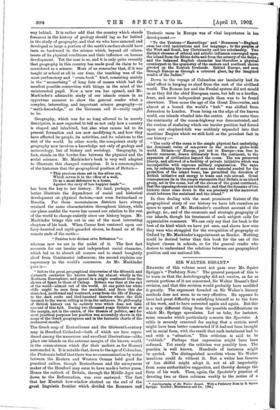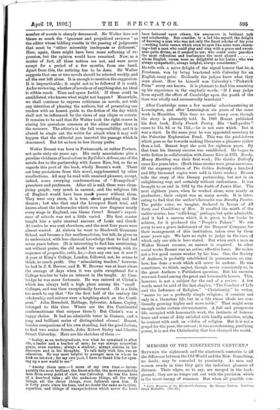SIR WALTER BESANT.*
READERS of this volume must not pass over Mr. Squire Sprigge's "Prefatory Note." The general purport of this is to warn us that the Autobiography did not receive, as far as certain portions of it are concerned, Sir Walter Besant's final revision, and that this revision would probably have modified it greatly. The argument founded on Sir Walter's literary methods does not seem to us very effective. He appears to have had great difficulty in satisfying himself as to the form of his work, and to have corrected again and again. But this is a very different thing from the possible modifications on which Mr. Sprigge speculates. Let us take, for instance, some remarks which particularly concern the Spectator. A critic is severely censured for saying that a certain novel might have been better constructed if it had not been brought out in serial form, with the result that each instalment had to end with a "situation." This criticism is said to be "rubbish." Perhaps that expression might have been softened. Yet surely the criticism was possibly true. The practice is well known. Hundreds of instances might be quoted. The distinguished novelists whom Sir Walter mentions could do without it. But a writer less famous or less skilful might adopt it, not at all improbably from some authoritative suggestion, and thereby damage the form of his work. Then, again, the Spectator's practice of devoting two or three columns weekly to the notice of a • Autobiography of Sir Waiter Besant. With a Prefatory Note by S. Squire Sprigge. London : Hutchinson and Co. [16e.]
number of novels is sharply denounced. Sir Walter does not blame so much the "ignorant and prejudiced reviewer" as the editor whose bidding results in the passing of judgments that must be " either miserably inadequate or dishonest." Here, again, there might have been some softening of ex- pression, but the opinion would have remained. Now, as a matter of fact, all these notices are not, and were never except for a period of a few months, from one hand. Apart from this, the noticing has to be done. Sir Walter suggests that one or two novels should be selected weekly, and all the rest left alone. It is enough to mention the suggestion.
It is impracticable ; it ought not to be followed if it could. As for reviewing, whether of novels or of anything else, no ideal is within reach. Time and space forbid. If these could be annihilated, who knows what might not happen P Meanwhile, we shall continue to express criticisms on novels, not with any intention of pleasing the authors, but of presenting our readers with an honest guide to the fiction of the day which shall not be influenced by the views of any clique or coterie. It remains to be said that Sir Walter took the right course in aiming his querulous censures at the editor rather than at the reviewer. The editor's is the full responsibility, and it is absurd to single out the writer for attack when it may well happen that the editorial pen inserted the passage which is denounced. But let us turn to less thorny paths.
Walter Besant was born in Portsmouth, or rather Portsea, not quite sixty-six years ago. His early associations give a peculiar vividness of local colour to By Celia's Arbour, one of the novels due to the partnership with James Rice, but, so far as regards this part of the book, wholly Besant's work. There are long quotations from this novel, supplemented by other recollections. All may be read with unmixed pleasure, except, indeed, some sweeping condemnations of "Evangelical" preachers and professors. After all is said, these were clean- living people, very much in earnest, and the religious life of England would have been much poorer without them.
They were very stern, it is true, *out gambling and the theatre ; but who that read the Liverpool Bank trial, and knows about the indecencies which even now disgrace nearly every stage in England, can blame them ? Besant's experi- ence of schools was not a little varied. His first master taught him a quite unusual amount of Latin and Greek. At twelve he was sent elsewhere, and the next four years were almost wasted. At sixteen he went to Stockwell Grammar School, and became a fair mathematician, but left, he gives us to understand, with less classical knowledge than he had had seven years before. (It is interesting to find him mentioning, not without praise, the old model for essay-writing, with its sequence of propositio, ratio, &c.,—does any one use it now ?) A year at King's College, London, followed, not, he seems to think, to much profit. One " stimulating teacher," however, he had in J. S. Brewer, and R. W. Browne was at least above the average of days when it was quite exceptional for a College teacher to take an interest in the taught. At Cam- bridge he was more fortunate. He was entered at Christ's, which has always held a high place among the "small Colleges, and was then exceptionally favoured. (It is a little too much to say that "for the first half of the century the scholarship and science were a laughing-stock on the Conti- nent." John Herschell, Babbage, Sylvester, Adams, Cayley,
belonged to this time. Where are the five Continental mathematicians that surpass them P) But Christ's was a happy choice. It had an admirable tutor in Gunson, and a long and brilliant series of distinguished alumni. Besant, besides companions of his own standing, had the good fortune to find two senior friends, John Robert Seeley and Charles Stuart Calverley. Here are his sketches of them :—
" Seeley, as an undergraduate, was what he remained in after life, a leader and a teacher of men ; he was always somewhat grave, even austere ; always a student ; always serious in his discourse and in his thoughts. To talk daily with him was an education. He was most helpful to younger men in whom he took an interest ; for my own part, I have to thank him for open- ing up a new world to me."
" Among these men — I mean of my own time — incom- parably the most brilliant, the finest scholar, the most remarkable man from every point of view, was Calverley. He was the hero of a hundred tales ; all the audacious things, all the witty things, all the clever things, were fathered upon him. It is forty years since his time, and no doubt the same audacities, repartees, and things of unexpectedness which never die have been fathered upon others, his successors in brilliant talk and scholarship. But consider, to a lad like myself, the delight of knowing a man who was not only the finest scholar of his year —writing Latin verses which even to eyes like mine were charm- ing—but a man who could play and sing with a grace and sweet- ness quite divine, as it seemed to me; who could make parodiea
the most ridiculous and burlesques the most absurd whose English verses were as delightful as his Latin ; who was always sympathetic, always helpful, always considerate."
He tells with a naive delight of the signal honour that he, a
Freshman, won by being bracketed with Calverley for an English essay prize. Evidently the judges knew what they
were about. How he himself won Calverley's "Pickwick Prize" every one knows. It is pleasant to find him summing up his experience in the emphatic words : " If I may judge from myself, the effect of Cambridge upon the youth of the time was wholly and unreservedly beneficial."
After Cambridge came a few months' schoolmastering at Leamington, and after Leamington six years of the same work in Mauritius. This time we must hurry over, though the story is pleasantly told. In 1868 Besant published his first book, Early French Poetry. His " half-profits " came to lls. 8d. or 8s. 11d.,—he is not sure which. But it was a start. In the same year he was appointed secretary to
the Palestine Exploration Fund. This was the pied-cc-terra which goes so far towards making literature a pleasure rather
than a toiL Besant kept the post for eighteen years. By that time his literary success was established. He began to
write fiction in collaboration with James Rice in 1871. Beady- Money Mortiboy was their first work ; The Golden Butterfly came five years later. (Both these stories were great successes. Of the sixpenny edition of The Golden Butterfly a hundred and fifty thousand copies were sold in three weeks.) Besant
tells the story of this literary partnership, but not in an enlightening way, and certainly without enthusiasm. It was brought to an end in 1882 by the death of James Rice. The next eighteen years, when he worked alone, were nearly as productive ; their output was as many novels. It is inter- esting to find that the author's favourite was Dorothy Forster.
The public voice, we imagine, declared in favour of All Sorts and Conditions of Men. It recalled the mirth of the earlier stories; less "rollicking," perhaps, but quite admirable. And it had a success which it is given to few books to achieve, for it produced the " People's Palace." We are sorry to see a grave indictment of the Drapers' Company for their management of this institution, taken over by them some years ago. We have no right to judge in the case, of which only one side is here stated. But when such a man as Walter Besant accuses, an answer is required. In other social works Besant was an active, effective force. He makes not a few good causes weaker by his loss. One, the Society of Authors, is probably established in permanence, or, any- how, has done a work which will never be undone. He was sometimes, we think, unjust, though never consciously so, in the great Authors v. Publishers question. But his enemies were not found among the great and honourable houses. This, however, is not a subject for the end of a review. A few words must be said of the last chapter, " The Conduct of Life and the Influence of Religion." " Christianity," he writes " seems to me a perfectly simple religion ; it consists noi only in a blameless life, but in a life whose ideals are con- tinually growing higher and more noble." That might seem enough under certain circumstances. A full and prosperous life, occupied with honourable work, the instincts of benevo- lence and sense of duty satisfied with kindly activities, might be content with such an eidolon of religion. But it is not a gospel for the poor, the outcast; it has no redeeming, purifying power, it is not the Christianity that has changed the world.











































 Previous page
Previous page